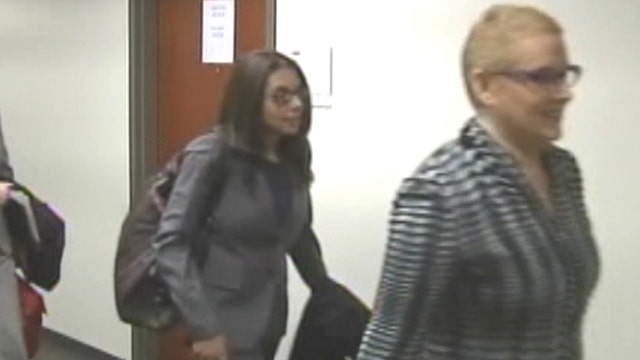FoxNews.com reporter arrives at court over story source
Raw video: Jana Winter faces contempt of court charges in case that could have First Amendment ramifications
The FoxNews.com reporter who broke the exclusive story about a notebook that Colorado shooter James Holmes sent to his psychiatrist, then refused to reveal her sources under threat of jail, was ordered to return to the Aurora courtroom April 10, in a case experts say has chilling ramifications for the First Amendment.
Arapahoe County District Judge Carlos Samour intends to question a detective for a second time about who leaked the notebook, and then could still put veteran reporter Jana Winter on the stand and try to compel her to reveal the sources of her story. Winter and attorneys for Fox News have resisted efforts by Holmes' defense team to make Winter reveal who may have violated a gag order issued by Judge William Sylvester, who reassigned the case to Samour. The order was issued in the days following Holmes' arrest in the horrific July 20, 2012 attack, which left 12 dead and 70 injured at an Aurora movie theater. Winter's story was published on July 25, and picked up by media outlets around the world.
The case is being monitored by First Amendment watchdogs and journalism advocates, who said Sylvester is sending an ominous message to the media – as well as the public – in asking Winter to reveal her sources.
[pullquote]
“This is the classic reason to have shield laws,” said Gene Policinski, senior vice president and executive director of the First Amendment Center, based in Washington, D.C. “There must be protection for journalists to be free to report what they know, because that is how the public takes measure independently of how the courts operate.”
Winter’s story cited unnamed law enforcement sources in describing the contents of the notebook Holmes sent to Dr. Lynne Fenton, a psychiatrist who saw Holmes while he was a neuroscience graduate student at the University of Colorado’s Boulder campus. Sylvester allowed Holmes’ lawyers to launch an investigation after the story ran in an attempt to uncover Winter’s sources, but none of the more than a dozen law enforcement officials who were called to testify admitted talking directly to the media. They were not asked to say if they had discussed the notebook with others.
Requiring the testimony of a reporter to learn who violated a gag order is rare – and almost never warranted - argued Gregg Leslie, legal defense director for the Arlington, Va.,-based Reporters Committee for Freedom of the Press.
“In a case like this, you initially understand the judge’s interest in finding out who violated an order, but you don’t do that by making a journalist violate their promises of confidentiality,” said Leslie, who said concerns that leaks violate a defendant’s right to a fair trial are often “overblown, or fade quickly.”
Reporters have a tradition of protecting sources, even under the threat of jail. Pulitzer Prize-winning reporter Judy Miller, currently a Fox News contributor but at the time with The New York Times, spent 85 days in jail in 2005 after refusing to appear before a federal grand jury investigating a leak in which Valerie Plame was outed as an undercover CIA operative.
Former San Francisco Chronicle reporters Lance Williams and Mark Fainaru-Wada, who wrote the 2006 book “Game of Shadows,” about Major League Baseball’s steroid scandal, were threatened with jail time by federal prosecutors when they refused to reveal how they obtained leaked grand jury testimony. The federal government eventually dropped the case against them.
Williams, now a senior reporter for the California-based Center for Investigative Reporting, told FoxNews.com dealing with confidential sources is an important part of the job.
“If a judge can just drag you into court and make you give up the person who gave you information anytime he feels like it, we’re not going to get help from people who have important information,” Williams said. “Ultimately, the community suffers.”










































